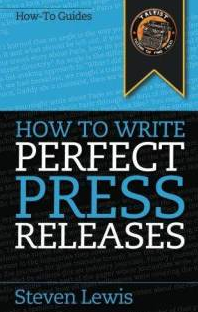OLD POST ALERT! This is an older post and although you might find some useful tips, any technical or publishing information is likely to be out of date. Please click on Start Here on the menu bar above to find links to my most useful articles, videos and podcast. Thanks and happy writing! – Joanna Penn
Podcast: Download (Duration: 38:38 — 26.7MB)
Subscribe: Spotify | TuneIn | RSS | More
Many authors want to get media attention, whether it's to build reputation or attempt to sell more books. But how do you do it without spamming everyone and getting nowhere? And how do you avoid spending loads of money on a publicist? In today's interview with Steven Lewis, I find out how to write perfect press releases.
In the intro I talk about why I've returned to print for my books, an update on my own writing and the importance of understanding keywords when publishing your books.

- Steven's background as a feature writer/ journalist and how he transitioned his career to writing travel books and speaking professionally as well as helping authors. As a journalist he received a LOT of press releases and the biggest issue was the difference between what the journalist is looking for vs/ what the author is trying to tell them.
- A few years back I decided to try and get some traditional media attention for my first book. Through strategic, targeted use of press releases I managed to get on national Australian TV, national radio shows, in national newspapers but it barely shifted any books. So is it even worth chasing traditional media if it doesn't sell books? Steven explains that media is more about reputation building and validation, although it can sell books as well if they are widely available.
- Why the book itself is not the story. People don't care that you wrote a book, they care about what it can do for them. Non-fiction is relatively easy because you can use your topic to craft an angle that suits readers. For example, Steven had a guided app tour of Sydney Harbour and got press about it related to tourism.
- How can fiction authors think of hooks for their books? Example of a novel about an Irish cop in Shanghai in 1920s could be framed around a travel article about Shanghai, or something aimed at the Irish community.
- How do you find your target audience? You should already have an idea of the target market for your book, your ideal reader. What else do they do apart from reading your book and where do they hang out? Look for publications that target this market, then drilldown to the specific journalists who write about specific aspects around the topic. For the maximum chance of success, target them specifically.
- The key elements of a press release. The purpose is to paint a picture of a kind of story the journalist might want to write. Use an arresting headline. [I recommend Copyblogger's headline clinic to get better at headlines for both press releases and also blogging.] Then start with the biggest news and work down to the least important detail. A press release has more formal language than a blog post because you are cramming facts in and must keep it short. Keep it to one page but use a decent sized font.
- How to submit a press release. Use the headline in the subject line of the email. Put the text in the text of the email so the journalist doesn't have to open any other document. Paid/free press release services basically spam thousands of journalists with no targeting, so Steven doesn't think much of those for actual media attention. It's better to target specifically.
- HelpAReporter.com is brilliant though, so definitely subscribe. Steven also mentions Sourcebottle.com.au which is a similar service to match journalists with experts. Having a platform is also fantastic as people find you through the internet. I mention a Jungian journal that interviewed me about Pentecost.
- Make sure you have a Google Alert for your name and book title and any key-phrases, since sometimes you won't be notified if media is actually published.

Check out How to Write Perfect Press Releases on Amazon and other ebook stores.


Great podcast. It is funny when you think about it, novelist spend years writing the perfect novel while worry over a 200 word press release. They are important though I have initially passed off some of my most favorite works because of poor press release. I guess I need to get started with my platform.
Thanks for the article guys. I was wondering about this part of the marketing campaign. I recently released my first book and did virtually no marketing. I didn’t even do a book launch. Apart from the odd mention on my blog or a tweet here and there, I don’t do any promotion. Admittedly, I’m not sure how to best approach this part so now I’m writing the next book until I can figure it out. I’ll definitely do a book launch for the second book. I at least know that. ;-p
Hi Woelf,
You wouldn’t just want to think about the press when it comes to launching your book, especially if you’re thinking the release would just announce the launch of the book. Unfortunately, a book launch is only really news for the authors. With thousands of books launched every day, it would have to be exceptional for the press to be interested, which means a major work or a major author. You need to be thinking about other angles and times you could seek media, it’s about angles and timing. We talk about that in the video but there is of course more information in the book 🙂
Yep, I’ve figured that part out, thanks Steven. My approach so far has been low-key, and like I said, I’m working on the next book while I learn more about this. The best I can do when it comes to the launch, is prepare a cute invitation and send it out to people on my friends list and possibly some other people with clout. I suppose they could ignore me, but in reality, and based on my limited information, there is not much else that I can do at this point. Thanks again.
Really good article. The press release is almost the final piece in the marketing puzzle – well actually there is no final piece as it’s ongoing – but it’s not one that comes naturally for most writers Thanks so much for the post and the podcast.
El JAmes – who wrote the 50 shades series works in the television industry. I really think that she had the skills (or knew who to ask) to write a great press release. Thanks for this.
Do you have examples you can cite online of press releases that “look” completely different from everything else — and work because of their difference? Whether different font choices or embedded pictures or certain testimonials, etc., what do you think?
Hi Ari,
“How to Write Perfect Press Releases” is a short book but there’s only so much Joanna and I could talk about. There’s unlikely to be any place for testimonials in a press release, I don’t think I’ve ever used one. Pictures and other attachments are discussed in the book but, in a nutshell, you’re likely to be sending your release by email and no one is going to thank you for attaching pictures.
And I certainly wouldn’t be playing around with font choice, either. Think of your press release as like the inside of a novel: it’s going to be judged on the words, not the font choice. Journalists are professionals. They read press releases for a living, they don’t need them to be visually arresting. Trust me, your release will stand out from the mediocre, untargetted guff they’re drowning in if it’s any good.
Steven, you’re OK with every press release looking the same? How is YOUR release going to stand out from the crowd that come through the wire — inspiring the reader to take action?
I can relate to this podcast because I’m also majoring in journalism as well as creative writing and one of the things my teachers always tell me is to make sure what ever the “news” has “news value”.
News value is when something is public interest. There are nine of them. The ones that come to my head now is proximity (how close the news is to where the readers are), human interest (emotional stuff that people eat up), Timeliness (how recent the news is). Those are just a few that journalism look for when deciding what to write about. They do this so they know their audience will be interested in the news.
Thanks for the post Joanna.
If it is about building credentials, to support, say, a career as an consultant or lecturer (giving talks) related to the topic of your book, then any kind of story in traditional media which can be linked to your name and book will be worth much. When investigating the possibility for getting these kinds of positions, I’ve often felt that there is still very much a bias towards traditional media, especially in the university world – but also with other educational institutions, libraries, clubs and other outlets for public lecturing/speaking venues.
It is interesting if you can come and say you have this new book that you want to talk about. But you are just so much more interesting if you can point to an article in traditional (printed) media (not a review in this case) that has some concrete relation with the topic of your book – or perhaps even mentions, you and your work. 🙂
Jawg
—
history-coaches.blogspot.com
‘Those who can learn from history, should repeat it … ‘
I’m a first time author and at that point where I need to start focusing on writing press releases. I look forward to this book and what it has to offer. My book launch is approaching and I want to draw as much attention to my new book as possible.
Excellent podcast and spot on. I particularly liked the metaphor of the press release that gets round to mentioning at the end that the building is on fire. I’ve seen so many like that.
Good stuff.
Charles